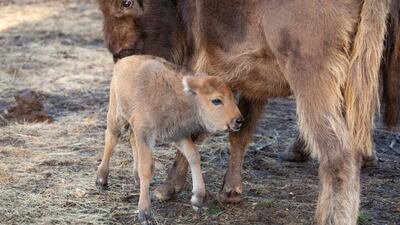A baby bison has been born in the UK, the first calf in a pioneering rewilding project.
Three female bison were released into woods near Canterbury in July but now rangers realise one of them was pregnant.
Bison are known to try to hide pregnancies in the wild to avoid becoming a target for predators but it was not known that one of the females was already expecting when they were dropped off in West Blean and Thornden Woods.
“When the bison took their first steps into the wild just weeks ago, it was hard to imagine that anything could come close to the elation we felt in that moment,” director of zoo operations at the Wildwood Trust Mark Habben said.
“But here we are celebrating the arrival of a bison calf.
“Groundbreaking projects like this, by their nature, always carry an element of the unexpected but this addition to the herd has come as a significant surprise, albeit a very welcome one.

“We are delighted that mother and calf are both doing well and look forward to watching the herd continue to grow and flourish in the coming months.”
The announcement of the birth, which was discovered on September 9, was delayed after Queen Elizabeth II's death on September 8.
Bison act as ecosystem engineers — creating light and space for wildlife to thrive through their natural behaviours — making the baby bison “an exciting development” for the project.
“These animals are wild, so we want to remain as hands-off as possible, but their welfare is at the absolute heart of what we do,” ranger Tom Gibbs said.

“She is being observed by experts and we are constantly monitoring the whole herd to ensure their well-being.
“We always hoped that the bison would breed, but it is fair to say we were not anticipating it quite so soon.”
The bison are part of the Wilder Blean project, an initiative by the Kent Wildlife Trust and Wildwood Trust aiming to combat the climate and biodiversity crises.
The bison are due to be joined by a bull within the next two months.
All 9,000 bison alive in Europe are descended from 12 zoo animals, after they came close to extinction in the early 20th century.
Paul Hadaway, director of conservation at Kent Wildlife Trust, said: “This is an exciting development within a pioneering project.”
“European bison are an incredible species, which were on the brink of extinction after the First World War.
“To think that their numbers now swell beyond 9,000 is a true testament to the commitment and dedication of international breeding efforts and, as an organisation, Kent Wildlife Trust are privileged to now be part of that journey.”


